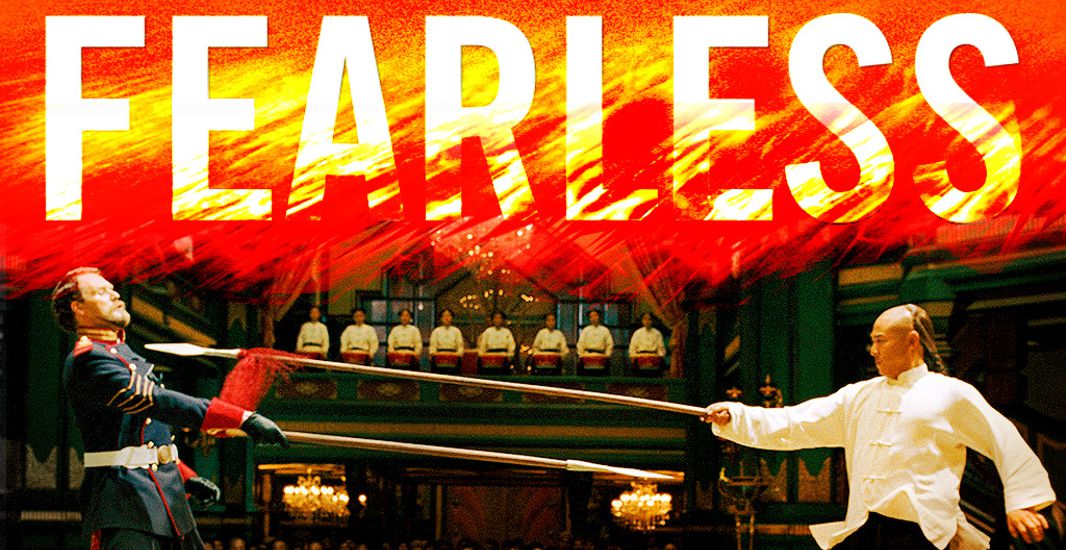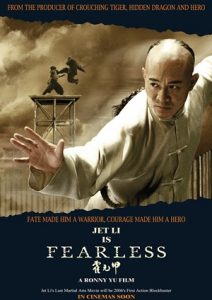 As martial artists go, there’s no one like Jet Li. Most Americans know him as just another action star, but Li’s background is outstanding and Jet Li is Fearless. Before he reached puberty, he served as an international ambassador, a key figure in the parting of the bamboo curtain that separated China and America in the 1970s. His precocious repartee with President Nixon showed the world that this son of Mainland China was someone to be watched. Indeed, with the possible exception of Zhang Ziyi, Jet is the only star from the most populous nation on the planet who is recognized internationally (Bruce and Jackie have roots in Hong Kong at the time it was a British Colony). By age eighteen, Jet had won five all-around championships – a record that still stands today. His first film, SHAOLIN TEMPLE (1982), broke box office records across Asia and was the catalyst for restoring the real Shaolin Temple, our most venerated martial institution, the birthplace of kung fu and Zen (or Chan as the Chinese originally called it). Since then, Jet has starred in over thirty films as well as his own video game.
As martial artists go, there’s no one like Jet Li. Most Americans know him as just another action star, but Li’s background is outstanding and Jet Li is Fearless. Before he reached puberty, he served as an international ambassador, a key figure in the parting of the bamboo curtain that separated China and America in the 1970s. His precocious repartee with President Nixon showed the world that this son of Mainland China was someone to be watched. Indeed, with the possible exception of Zhang Ziyi, Jet is the only star from the most populous nation on the planet who is recognized internationally (Bruce and Jackie have roots in Hong Kong at the time it was a British Colony). By age eighteen, Jet had won five all-around championships – a record that still stands today. His first film, SHAOLIN TEMPLE (1982), broke box office records across Asia and was the catalyst for restoring the real Shaolin Temple, our most venerated martial institution, the birthplace of kung fu and Zen (or Chan as the Chinese originally called it). Since then, Jet has starred in over thirty films as well as his own video game.
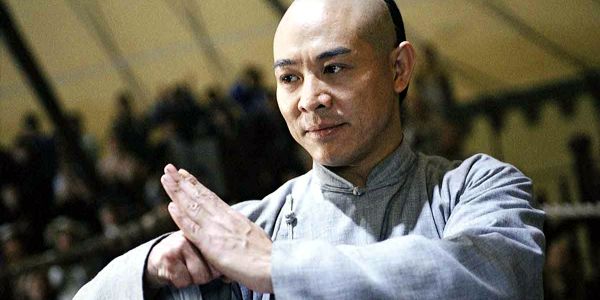
Now, Jet is returning to the kind of film he does best. FEARLESS is a period kung fu film, loosely based on the seminal historical figure Huo Yuan Jia. We caught up with Jet Li in Shanghai. His voice was already hoarse from countless interviews about FEARLESS.
GC: FEARLESS is billed as your “final martial arts epic,” but the buzz is that you’re doing ROGUE. Why isn’t that a martial arts film?
JL: I think (the) martial arts have two parts. Usually, when we talk about the physical, one is external, one is internal. But whatever is external or internal, they are both the physical part. If you want to be a martial artist, we talk about the mental. Through martial arts, you learn how to be a nice person.
We see a lot of action films – waaah! – they only use the physical part on the film. You can make all kinds of action films. You can use martial arts to talk about your own story. That story doesn’t talk about how to be a nice person. I think (this is) a big difference if you want to be the martial artist. FEARLESS talks (about) this very deeply: how to learn martial arts, why learn martial arts, how to use martial arts, how to be the martial artist. Not so many movies can talk about that subject.
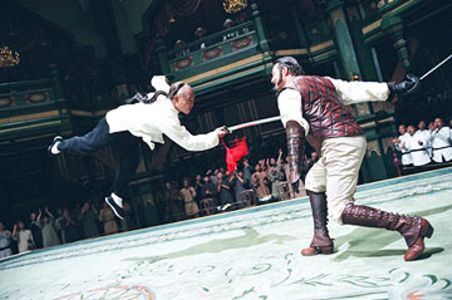
GC: So for you, a martial arts movie must have a moral code, otherwise it’s just an action film.
JL: Yes, very clearly. Not just the physical part. We see many, many action films in Hong Kong, usually using (the) martial arts physical part to talk about love story, some kind of story. All I want to talk (about), everything (is) in this movie. Until now, I can’t think about something more deep (in) the philosophy part.
GC: You’ve said that you identify with Huo Yuan Jia. Why?
JL: You know my background – eight years old, (I was) learning martial arts. I don’t know why I’m learning martial arts. After I learned, the coach, everybody tell me, you need to be the best. You need to be champion. That’s the only goal in my heart as a teenager. Then I got five all-around champions in a row, (and) I (was) quite happy. And then I make movies, and became very famous.
So deep inside, you have self-centered. You think you’re better than everyone. You don’t say the words, but in your heart, you feel that way. You’re quite good. Everything Jet Li in Fearlessyou do is good. Through the journey, you have a bomb. Your career will drop at some point, through the bottom. (Then) you will understand the life. You understand everything (is) like a movie – need a good director, good co-star, good action director, to work together. Then it comes out, you’re just a flower. You need a lot of leaves to make the flower beautiful. If you’re alone, you cannot make a beautiful movie. So through failure you understand more. You get to the next level to understand life – through failure.
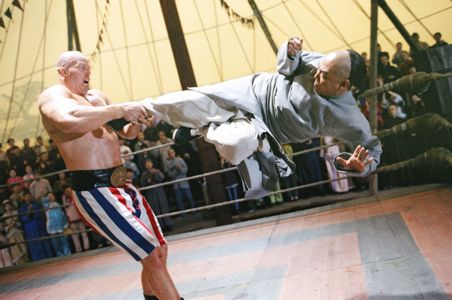
I think I only focus on Huo Yuan Jia if I think the truth is told. He started (the) Chin Woo school, (and) then died…. The story inside is not true. (But) right away, I feel one person will go to that journey. Even today, a lot of younger martial artists or younger stars – you can see them – when they start successful, they are very self-centered. Ego heads. (They) walk down the street, buy all the tables for dinner. You can see them. Show the power. Show the ‘everything.’ You can see that. If not a hundred years ago, you see them today. You can see that kind of personality through that journey.
GC: Adding Huo Yuan Jia in FEARLESS, you’ve portrayed more historical martial arts legends than anyone. But with China’s vast history, there must still be a few left. Do you have any dream roles?
JL: Even though I made a lot of movies like Zhang San Feng (TAI CHI MASTER), Jet Li FearlessFong Sai Yuk, Wong Fei Hung (ONCE UPON A TIME IN CHINA), I think FEARLESS has the biggest philosophy in it. Which kind of martial arts is the best? I give the answer in the movie. Learning martial arts, how to use them, talk about revenge, application, everything. I don’t see any method or real person I really want to make in the future. One movie I want to make – MONK IN NEW YORK. I’ve talked about that for nine years, but I didn’t have the opportunity to make it yet.
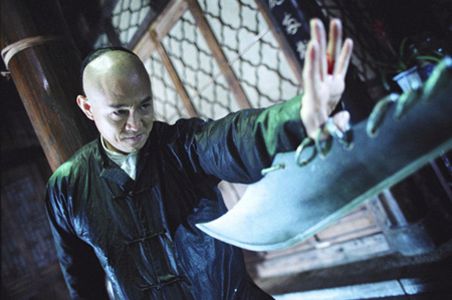
GC: How is that going?
JL: I already find a wonderful director, Wang Wing, who rewrites the script, but we need to find someone to support because no studio wants to make that kind of movie until now. They want to see violence. They want to see fighting. They want to make money.
GC: Everyone only wants to see you fight. What do you think about that?
JL: Eh, it’s ok, because that’s business. I understood it’s not just their own opinion. It’s all the movie companies. They have the responsibility to make money for the share holder and stock market, you know? I understand that completely. They need to make money for the studio. That’s why I continue to make commercial movies. But at the same time, I try to find the room to find the people to make something I really want to make. Even if that movie may have the chance to lose money (laughs). Well, nobody knows.
GC: Everyone knows you in Asia, but you’re one of only a few Asian celebrities in America. How does that make you feel?
JL: I think it’s not what I feel. It’s the audience. When they like you, they support you. That doesn’t mean they support you in the future. So my philosophy is the past already past. The future (is) not coming yet. Each movie I will do my best. I only can do the work. That’s it.
I understand one day the audience will say, “Jet Li is too old. I don’t like him anymore.” I’m very happy because I know that is the reality. I will be very happy to go back – go home – to do something else I really want to do. Understand (that) if you say “life like a game,” I know the system. You see a lot of huge stars in world, action stars, Stallone, Arnold, they will get old one day. Then automatically they will go home. Even the President, four years, eight years, they will go home. So that’s the reality. It’s very fair. And if I do my best, if the audience supports me, I feel good, but if not, I understand. I really appreciate in the past they always support me. But when this character for actor – myself – is done in the life, I do something else.
GC: Has America changed you?
JL: Of course! When I was a little boy, I only listened to adults talk about America – some things good, some things bad. But when I went there, 1974, I see something different, so (it) made me think intently, when I was 11. I need to see myself. I don’t need to listen to parents or teachers. They tell me what they believe. The truth I saw was different. I cannot say completely 100% America is good or that 100% Chinese is good. When I was a teenager, I already know every country had good things (and) bad things at the same time. Bad cop, good cop. Not like the younger generation Chinese people. Teenagers, they got all their information that says China has wonderful history. We’re the best! The American people believe they’re the best country – most freedom in the world – they want to teach the other countries how to have freedom. I don’t think that way – it depends on different culture, on your sense of yin and yang. If you’re (of a) very strong opinion, to see yin is something else or yang is something else. I learned a lot. Of course!
GC: How has America affected your moviemaking?
JL: Everyone only has a big dream in Hollywood. When you work in Hollywood, you know the game more – you know who controls – green light the movie, who’s the director, who’s next. The system. You know the game, how to play. I think you study three years, I understood American game, how to play.
In Asia, it’s different. Two people, three people, they believe in one story. They go right away. They make it. Maybe successful, maybe not. The game is small. When (it) is (an) international corporation, they need to consider a lot of things. In (the) Hong Kong movie industry, (it’s) like a family – small family, small company. One man, two man, family. They say “go, do this” – can make money. Then they go. Some side is good. Some side they have a different energy, a different style. Like in FEARLESS, I don’t have a chance to make this in the states. Find a studio (to) make a Chinese story, you know. But in Asia, I can do.
GC: Given the new rules in competitive wushu, do you think anyone will ever break your winning record?
JL: I really don’t know. There are a lot of martial artists in China, learning martial art, practice martial art, practice last 20-30 years. We really don’t have the chance to find a younger generation (person) who can do martial arts well, and at the same time make a movie well. Everybody worries about that. Talk about life! Everybody tries to find a younger Jet Li or younger Jackie Chan, whatever, next generation. But I think it’s the audience. They are the real boss. When they support an actor, then that actor will have a chance to make a movie well, (and) make money for the studio.
I think the sports martial arts is only the part of martial arts. Somebody really wants to support martial arts go to the Olympics, but this is just part of the sports. It’s not the whole martial arts. In my opinion, martial arts have four major parts. One way is Olympics, sports. One is self defense. People (who are) learning that may be a bodyguard, a security guard, cop or soldier – different kind of force. That’s the second part. Third part is health – learning martial arts, Taiji, something, just for health. The fourth is a lot of people (that are) learning martial arts really want to be in entertainment. (They) want to make movie, want to make a television, want to make a cartoon, everything. Even martial arts have a four major parts.
GC: What is your practice like now?
JL: My daily training, I just take some energy, just do some forms. I spend a lot of time to meditate. I meditate to understand each form. Each form is from outside energy, to learn from outside to inside, you know, like Shaolin. Use the physical, the outside physical moves to help your internal circulation. The other part of the martial arts is internal. Use your mind move free – to help the circulation. (It’s) better for the body. But when you meditate, when you go to the next level, you have no enemies. The only physical enemy is yourself. You don’t need to fight with people – (you learn) how to use the energy to convince yourself to be fearless. And you know your goal – greed, anger, how to control them, how to stop them. Turn the negative to the positive. And help people. In my age right now, I’m more focused on that.
GC: Do you have any students?
JL: No.
GC: Ever want any?
JL: No. I don’t think I’m a very good coach or I’m a good director. I think I’m good at promoting something, like through the movie – promote martial arts. After that you can find different coach, learn different styles. I will tell you, four kinds of martial arts, whatever you learn, you choose yourself. Then I walk away. Like in an investor. Show the world. Not a coach to teaching the students. I think that way, because I make a movie, that way I can reach more people.
GC: What inspires you now?
JL: In my personal life, I think finished.
GC: What?
JL: In my personal life, I think I’ve already finished in forty years.
GC: Really?
JL: Yes. I do the martial arts. I hope through the movies, to show the world, they have wonderful sport called the martial arts. Whatever religion you are, culture you are, you need a good body. You need health. That’s why I show martial arts through the movies when I was younger. Now I try to prove I’m very successful. I make a different kind of movie. I’m famous. I make money. I take care of my family, my mother, my sister, my wife, my children. After all, where is the end? You will continue work for what? Through your whole life.
That’s why now I study Buddhism because I don’t see the end. Always have more famous people than you, more powerful people than you, more people make more money than you. You want to chase them, through to the end of the day, when you die. Before you die, they still say “I can do better job.” You’re hungry for something. But now, I have my family and my life and through the Buddhism. After 40 years old, I have nothing to do myself. I try to learn and help people.
I still make movies because I still want to have the room to talk about the life. If I don’t make movies, no reporter, no one wants to listen to me. I have to keep working, but it’s not the most important thing. I want to give them my love for everything I leave, to the younger people to understand life, to share the message. I think that is my goal.
GC: Where do you see yourself in ten years?
JL: I’m deciding to slow down my life. It takes half (of the) energy of my life to do movies continually. I will do more study in Buddhism and more charity work.
GC: What kind of Buddhism are you studying?
JL: Actually all kinds. I have more than twenty teachers. Mostly it’s Tibetan Buddhism. But also I’m learning Chan, like Shaolin temple, Chan Buddhism. But these two, no difference. If you see the outside, it’s different, like martial arts have different styles, but the center is the same. The form doesn’t mean anything. The form (is) from your heart.
GC: I once heard that you were raised Buddhist and vegetarian, but Wu Bin made you eat meat for training. What’s the story behind your Buddhism?
JL: I think while learning martial arts, not just the physical, but the philosophy, I understood yin and yang. You will know the world: man, woman; employee, boss; father, children. Each side has their own opinion. Even the countries have their different culture. They see things in right and wrong. Maybe this country think they did something right. The other country says it’s something wrong. Through yin and yang, you can understand more about the world.
Ten years ago, I study Buddhism. I more understand if you have a point of view, you see everything is yin and yang. But that doesn’t mean right and wrong. So you need to learn your self center. If you understand the universe, then you have nothing, no opinion in your heart. You don’t need to decide which thing is right, which thing is wrong. It’s much different. Like after yin yang, you have wuji. Emptiness. In emptiness, then the universe is empty. Everything comes out naturally. The people will give an opinion. Even if they give an opinion, that doesn’t mean that’s right. You know what I mean? It’s very difficult to explain.
I believe the biggest enemy is myself, like the movie FEARLESS talks about. You’re afraid of a lot of things. You worry about a lot of things. You have hope for a lot of things. Everything makes your emotion struggle. You get a hard time. How to make them stop? How to make negative become positive every day? If you help people, you’re happy, you understand life.
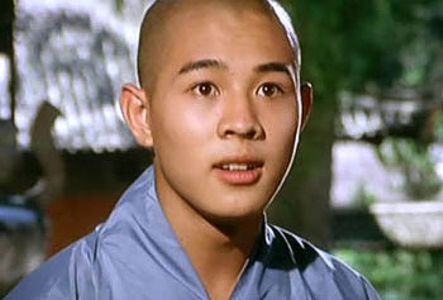
GC: As a Buddhist, it must make you very happy that your first film, SHAOLIN TEMPLE, helped rebuild Shaolin.
JL: At that time, after Cultural Revolution, you know religion in that time, 1960s-70s, stopped in the whole country. They only had one cook, one abbot, and another that took care of the door and all the books. That’s it. I met them. They opened the door for us. We see each room. Even at that point, I’m not a Buddhist.
Maybe the karma let me take the responsibility to make that movie. Since then, I think every year (they) have a million people visit Shaolin temple and I’m very happy to see that. Now it’s a very popular place. But at the same time, I worry about their spending a lot of energy focus (to) on the physical part. I don’t know how many people take it very seriously, to study philosophy, the true Buddhist idea. Seems like a lot of younger people watch the movie, go to there, learn martial arts, want to be famous, want to be kung fu demonstration, or something else. I hope they are not just focused only on the physical.
GC: How does your martial practice and your Buddhist practice relate?
JL: Martial arts can bring you to the yin and yang. (But it’s) really difficult to bring you across yin and yang. Usually in China, I don’t like something from America something, something, America doesn’t like Chinese something, something. You still need (to) stand on a side. Which side? Maybe yin, maybe yang. But if you want cross yin and yang, I spend a lot of energy but I can’t find it from martial art point of view.
I see a lot of mean martial artists. It’s too separate. They still want a bigger name, more power, or they want to say Japanese martial art is the best. Or somebody still wants to say Chinese martial art is the best. Even somebody say Shaolin martial art is better than everything. The other coach will say tai chi better than everything. So you can see, they still stand at one point to look at the world. So I didn’t see many martial artists really from the bottom of their heart cross past yin and yang. Even they say, “after yin and yang, you have nothing, emptiness,” but when they move, their heart still wants more power and money – more desire to be the best. That’s why I’m learning Buddhism. It makes me understand more. Go to the emptiness and happiness.
GC: Our charitable arm, the Tiger Claw Foundation, was the first in America to contribute to your charitable organization, the ONE foundation. How is that going?
JL: Oh yes! Thank you very much! Right now, in Hong Kong and America I only have the ONE Foundation. But the main thing I hope I can start a ONE Foundation in China. So I already sent the application to the government. Because you know that, three years ago, I heard that in 2003 in China, 280,000 people committed suicide. In 2004, they had 250,000. So that every year, they have a quarter million people commit suicide. For Buddhist like me, I feel very painful. I think about why. China’s economy is getting stronger and bigger. People’s lives are much easier than before. How can that amount of people commit suicide?
That’s why I made the movie FEARLESS. If you watch the movie, it has a strong message in it from the bottom of my heart saying “even (if) I don’t have the chance when I’m born, I have the courage enough to go to the end.” I think I need to share my life experiences to tell them say, “everybody, even you see the President, even you see the star, everybody got a hard time in their life.” Not just one way, if everything (is) like you see, you know. They’re popular, they make money, they’re very famous, everything happy – it’s not true. So I want to share some experiences through the movie, tell them say, “take care, understand life.”
I put a lot of energy. I went to many universities. I talked to the students. I really hope the government can give me the approval to start the ONE Foundation in mainland. I think that that’s urgent. In China, you can make in Asia, America, all over the world, it can be understood what Jet Li is doing. Because in the States, I think I’m only let in as the part of the movie industry. Not so many people understand. But in China, everybody knows Jet Li. If I want to do something, I have a major reporter network – newspapers, magazines, television – they will support. Let the people help each other.
In making this movie FEARLESS, you know that I want to talk to people committing suicide. A lot of people have only one side, only yin or only yang. You see a lot of people (who are) very popular, very famous, make money easily, but you don’t have a chance to know behind the other side. They’re lonely. They have a lot of pressure. They’ve had a hard time. That’s the other side. And you need to understand that. You need to take from them everything good. At the same time, you need to be aware of the negative side. You can not say, “I just want a big name, power, money, and I don’t take the responsibility.” That’s not life. That’s only the half.
Everybody has problems. Maybe they want to play one game but don’t have enough money. Or maybe they want to do something but they don’t have enough. At different ages, you went through the same thing. You want to buy the house. You don’t have enough money. You want to buy the car. You don’t have enough. (It’s) the same thing, just the material little bigger. The subject is a little bigger. The size is bigger. But the hunger – that you want – there’s nothing different. Is that clear?
GC: But you have all that. You’ve achieved international stardom.
JL: You need to understand, when I was little, I liked ice cream. It was my hope. I worked through a lot of things for that ice cream. Later on, you need a bicycle. Then later on, you have to have something else, something else. (laughs) It’s the subject getting bigger. But you really want – that feeling, the emotion – is the same. It doesn’t mean that people who have bigger subjects, big power, big money, are happy. Happiness is from your heart. (It’s) like when you get a trophy. You’re rich or not, you’re old or young, everybody will feel happy, lucky, tingly, whatever the feeling, you know what I mean? When you see your country in Olympics and you get a gold medal, even the President and the homeless, watching the show, feel happy. Everybody’s happy. The emotion is the same thing. They’re happy. There’s no money difference.
Everybody thinks if you have the money, have the power, you will (be) happy. But I don’t think that’s the only way. Having money gives you happiness, but it’s a very short time. You will have ego. You want bigger things happen. You have a small car. You have a bigger car. You have greedy ache – more and more and more. But the things – the material – never give you the real happiness. So that’s why everything depends on how you think. Fight with your big enemy inside you. If you control inside you, you will find true happiness. Make sense? That’s what I learned through my life.
GC: What advice do you have for the readers of Kung Fu Tai Chi?
JL: The most important enemy is yourself. Fight with it. Learn with it. Work with it. Turn the negative energy to the positive. The outside enemy is easy. Most important is inside.
© COPYRIGHT KUNGFUMAGAZINE.COM, ALL RIGHTS RESERVED.
All other uses contact us at gene@kungfumagazine.com.


